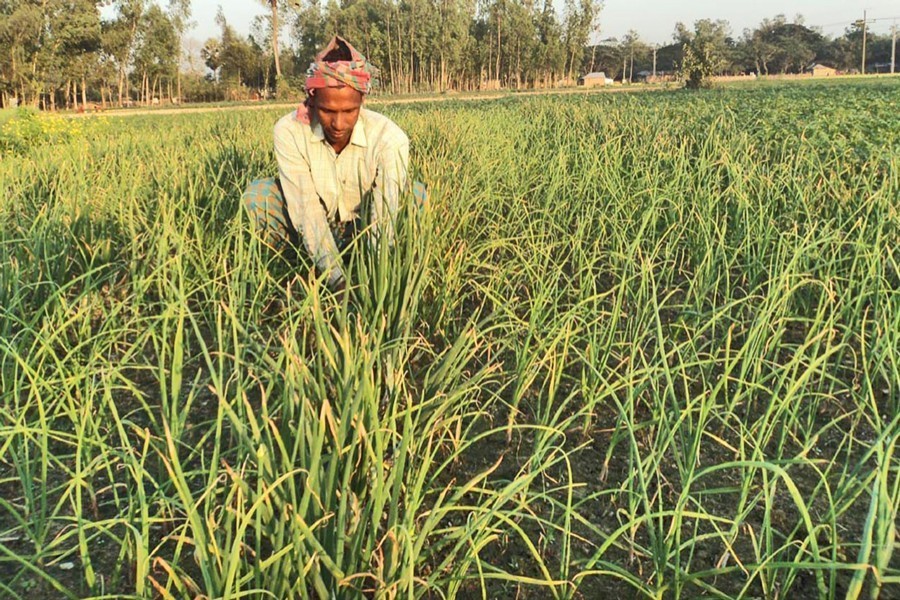The expenditure on agricultural subsidy has declined over the past five years, resulting in the low output of major staples, experts said.
The Ministry of Agriculture (MoA) stopped spending more than Tk 85 billion on farm subsidy from fiscal year (FY) 2013-14 to 2017-18, according to official statistics.
The MoA showed austerity this fiscal year too when 2.0 million farmers in 38 districts across the country incurred severe losses caused by floods.
The ministry might save Tk 24 billion out of Tk 90 billion allocated for fiscal year 2017-18, officials said.
Experts put stress on increased subsidy to encourage the country's farmers to ensure food security.
Expenditure has declined in the past five years, thanks to the low prices of fertilisers in the global market, a senior MoA official told the FE.
He said the allocation for farm subsidy was fixed at Tk 90 billion every year from FY 2013-14 to 2017-18.
The budget for FY 2018-19 has also proposed an allocation for Tk 90 billion in subsidy for agriculture.
The spending on subsidy was Tk 89.6 billion in FY 2013-14.
The actual costs declined to Tk 70.95 billion in FY '15, Tk 70 billion in FY '16 and Tk 69 billion in FY '17, the ministry official said.
The subsidy is going to be Tk 66 billion in the outgoing FY amid lesser imports of urea, he added.
He said fertiliser import usually eats up 80 per cent of the amount and the remaining goes to electricity rebate.
According to commodity data portal 'IndexMundi', urea prices have been ranging from $200 to $264 per tonne (Tk 16 to Tk 21 a kg) globally for the last five years.
It was $200 to $225 per tonne in FY '18.
Md Asaduzzaman, a professorial fellow at Bangladesh Institute of Development Studies (BIDS), said austerity is good news for a country like Bangladesh.
"But we see that production of some major crops fell during the period and the growth of crop sector remained below 1.0 per cent," he told the FE.
He said rice, wheat and summer vegetable output has showed a declining trend in the past three years.
Rice production dropped by more than 1.0 million tonnes in FY '17.
A fall in local production forced the country to import a record 4.0 million tonnes of rice worth $1.65 billion this fiscal, Mr Asaduzzaman said.
Boro production might regain in outgoing fiscal but expected growth in the sector would be hard to achieve amid fall in Aman output, he predicted.
Mr Asaduzzaman pointed out that farmers could re-cultivate after floods during Aman season last August.
"But 80 per cent of them couldn't do that for lack of funds," he said.
They should have got better compensation as they lost everything in the floods.
Centre for Policy Dialogue Director (research) Khandoker Golam Moazzem said, "As the MoA is not spending the total allocated funds, it's time to review the amount of subsidy."
"Either there's a need to review the amount of subsidy or the ministry is not capable of spending the money for farmers," he stated.
"But our study showed the losses caused by two spells of floods in 2017 were more than Tk 150.1 billion," Mr Moazzem mentioned.
The farmers should be compensated for better production, he said.
Only 0.6 million flood-hit people received government support to cultivate one bigha of land regardless of their losses last year, he said.
In terms of acreage, government incentives covered only 19.2 per cent of the total cultivable land affected by flash floods in 2017, he said.
Mr Moazzem said more than 1.8 million farmers switched to other professions in the last five years, finding agriculture non-profitable.
Both subsidies and ministry allocation for agriculture have been declining in terms of the country's GDP and total budgetary allocation, he added.
The government should raise allocation to encourage farmers in agriculture, which is a challenge in the 21st century's food security perspective, he added.
Bangladesh Agricultural Economists' Association Vice-president Prof Golam Hafiz Kennedy said the USA paid $20 billion subsidy to 2.1 million farmers in 2017.
The European Union also gave $46 billion to 12 million peasants in the same period, he added.
"But we couldn't even spend $1.0 billion for our 22 million farmers," he told the FE.
He said local farmers incurred Tk 6-Tk 8 losses at per kilogram paddy this Boro season.
Without saving money, Mr Kennedy said, the ministry could cut urea and TSP (triple super phosphate) prices to help farmers minimise their losses.


